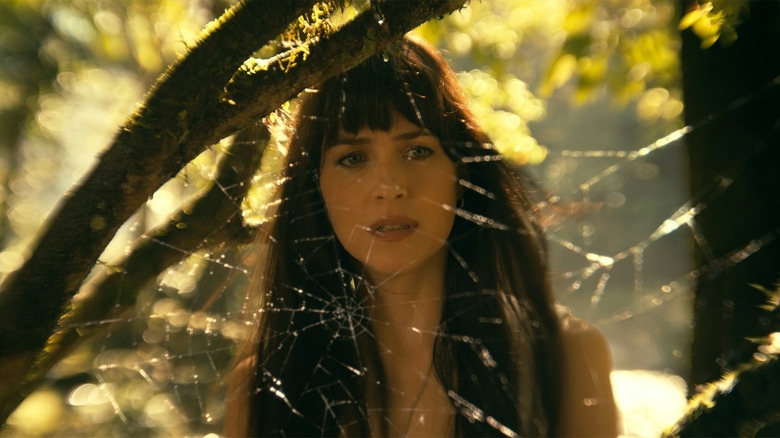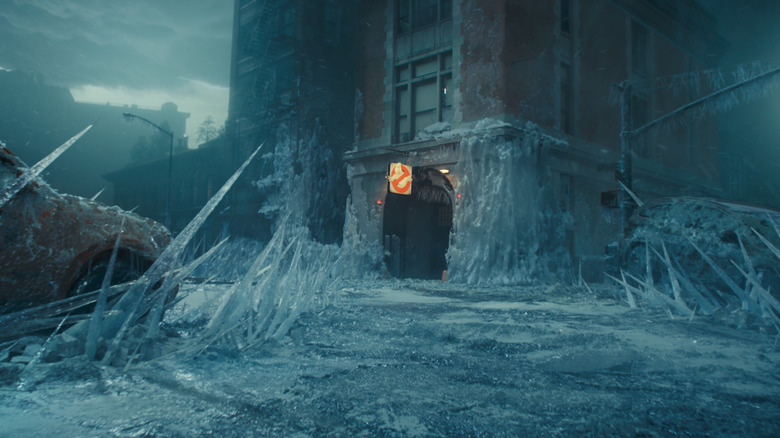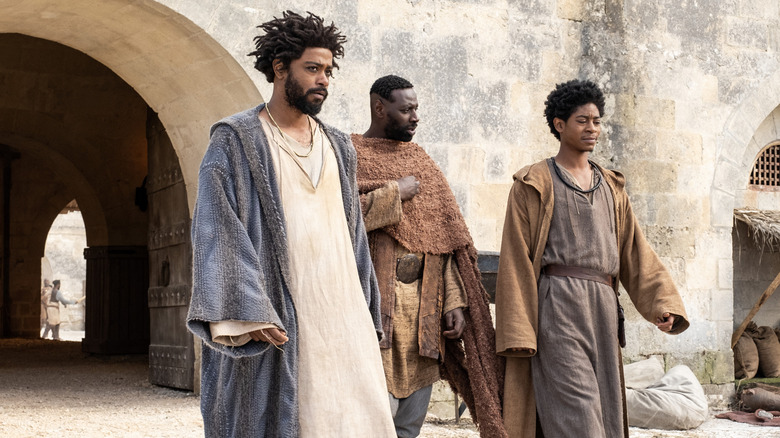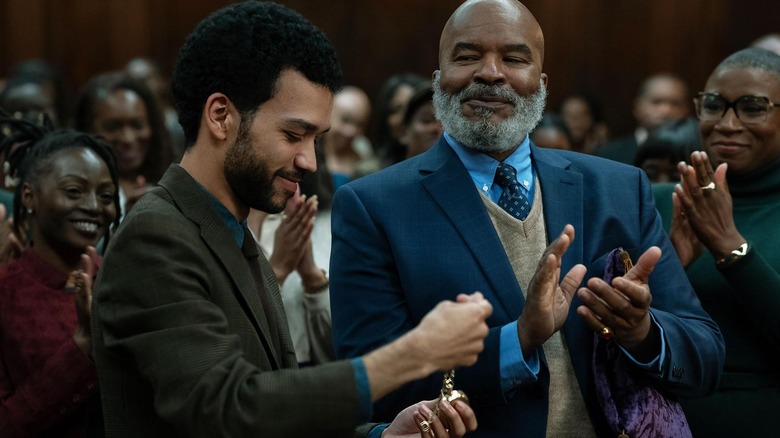The Biggest Box Office Flops Of 2024 So Far
2024 is an important year for the movie business. The past few years have been all about recovering from the pandemic. Now? Hollywood and theater chains are facing the challenge of weathering a year that has been crippled by 2023's Screen Actors Guild and Writers Guild of America strikes. There have been moments worth cheering about, such as the success of "Dune: Part Two." But, as always, there have been plenty of sour moments at the box office as well, with more than a few flops to go along with the hits.
The early part of the year was anchored by relatively smaller hits like director David Ayer's "The Beekeeper" and the "Mean Girls" musical. Mixed in along the way were a wide variety of misfires, from hopeful big studio blockbusters to smaller, original movies just trying to find their way in an uncertain theatrical landscape. Some of these flops should serve as warning signs to Hollywood at large. Others are just downright unfortunate. All of them now exist on the wrong side of various studio balance sheets.
This list is going to count down the biggest box office flops of the year so far. It is difficult to take movies like "Argylle," released by Apple and ultimately meant as a streaming play for Apple TV+, into account as the financial metrics are complicated. Beyond that, we looked at various factors such as overall ticket sales, budget, expectations, and critical reception to determine which movies missed the mark in 2024. Let's get into it.
I.S.S.
It does feel a little icky to pick on a smaller, original sci-fi movie that was fighting the good fight. Bleeker Street released the space-set thriller "I.S.S." in January, which was a very dead month this year even by the generally low box office standards associated with January in the movie business. The studio tried to drum up business for a reasonably budgeted, original film to give theaters something new to show at a time when there was little to show. It just didn't pan out.
Director Gabriela Cowperthwaite's "kill or be killed" thriller set aboard the International Space Station couldn't overcome mixed reviews to even be competitive against a slew of releases that had been in theaters for weeks, such as "Aquaman and the Lost Kingdom," "Anyone But You," "Wonka," and "The Beekeeper." Audiences just weren't sold on the film and, as a result, it opened to only $3 million. Almost no amount of good word-of-mouth can rescue a movie that makes that little money in wide release on opening weekend. It was dead on arrival. It only managed to stay in theaters for a few weeks and topped out at just $6.5 million.
The relatively good news for Bleeker Street is that the film reportedly cost less than $20 million to produce (before marketing). Horror films tend to have a longer shelf life and can find an audience over time. So, between VOD, streaming, cable rights, international sales, etc., this one might eventually make its money back. The studio lost small on this one compared to other movies on this list, but given that it's a smaller studio, the losses are harder to swallow. Small or not, there's no denying that it was a theatrical flop domestically. It was a blow for people who want to see more original films in theaters, that much is certain.
Ghostbusters: Frozen Empire
While the film (as of this writing) has not totally wrapped up its theatrical run, the story has been told well enough to know that "Ghostbusters: Frozen Empire" didn't pan out for Sony Pictures. Serving as a sequel to 2021's "Ghostbusters: Afterlife," this latest entry in the long-running franchise brought the action back to New York City. It was bigger and featured more nostalgic imagery to try and hook audiences. In the end, however, it proved to be almost exactly as appealing to moviegoers around the world as its predecessor. The only problem? Sony spent quite a bit more money on this one, making it a flop with no excuses to be made.
Directed by Gil Kenan, "Frozen Empire" cost $100 million to produce, whereas "Afterlife" was made for around $75 million. That makes a big difference to the bottom line when we consider that "Afterlife" pulled in $203 million worldwide, which was just enough to call it a win, especially since the box office was still in recovery mode in 2021. That gave Sony enough confidence to green-light a sequel with a bigger budget. That proved to be the undoing here as "Frozen Empire" opened to $45 million in March, representing an almost identical opening to its predecessor. It has since pulled in $176.6 million worldwide, with its theatrical run winding down. It is all but assured to finish with a near-identical final number as "Afterlife."
Roughly $200 million worldwide against a $100 million budget is going to leave Sony in the red on this one. The only real good news is that the film managed to push the "Ghostbusters" franchise past the $1 billion mark globally. The studio will be relying on other revenue streams such as merchandise and additional post-theatrical cash flow to help mitigate the losses here. Because this is a franchise with a loyal (yet limited) following, it probably won't be an outright disaster, but the result will almost certainly be enough to kill this incarnation of the franchise.
Arthur the King
Mark Wahlberg is and has been one of our biggest movie stars for a long time now. But, as of late, he's been trying to produce smaller-budget, feel-good movies. This year, he headlined the based on a true story tale "Arthur the King." On paper, it had a lot going for it. Aside from Wahlberg, it had "Shang-Chi" star Simu Liu, a very adorable dog, and a tale of overcoming triumph at the center of it all. For whatever reason, it just didn't resonate with general moviegoers enough to become a hit.
Director Simon Cellan Jones' film opened in mid-March just as "Dune: Part Two" and "Kung Fu Panda 4" were in the middle of impressive blockbuster theatrical runs. It kind of got buried, opening to a modest $7.6 million domestically. It held decently well but when your opening weekend number is that low, it's tough to mount a meaningful comeback. The movie is, as of this writing, still playing in theaters but its run is winding down. It has made $24.5 million domestically to go with a mere $6.6 million internationally for a running total of just over $31 million. That's not going to cut it, even for a movie with a pretty low $19 million production budget.
Lionsgate is only on the hook for the domestic rights so it will probably be okay. The international rights were sold off and it's hard to say who is going to lose out on the deal. But when factoring in marketing costs and a lack of merchandising opportunities, coupled with the big-name movie star heading this one up, it's hard to call this anything but a disappointment relative to expectations. The only real hope is that it overperforms on VOD. Even if that does happen, in terms of its theatrical performance, it was a swing and a miss.
Drive-Away Dolls
The Coen Brothers, as a directing duo, are behind some of the most beloved movies of all time, including "Fargo" and the Best Picture-winning hit "No Country for Old Men." In recent years, Joel and Ethan Coen have struck out on their own to make films individually. This year saw the release of Ethan Coen's solo feature debut hit theaters in the form of "Drive-Away Dolls." Unfortunately, despite coming from one-half of one of the most praised directing duos in history, the movie simply didn't make much of an impact and flopped pretty damn hard at the box office.
Released in late February, the road trip comedy was distributed by Focus Features. The studio had originally planned to release it last fall but delayed it, in no small part due to the Screen Actors Guild strike. The delay, it seems, didn't do much to help the film's commercial prospects. Against an iffy response from critics, "Drive-Away Dolls" earned a hugely disappointing $2.4 million on its opening weekend. That killed its chances of even becoming a modest success from the jump. Again, as with several other movies on this list, it benefits a bit from having a small budget in the $20 million range. Still, when your movie tops out at $5 million domestically with just $1.7 million internationally, it's bad news. Less than $7 million worldwide is a pitiful sum for the guy who helped deliver classics like "The Big Lebowski."
The only saving grace is that Focus Features has, in the pandemic era, pivoted its business model to focus more on VOD. Even so, there's no question that the studio was hoping for a much, much better result from this one before having to rely on digital rentals to cover the cost. If it ever does more than break even, that would be about as good as anyone can expect with such a poor showing in theaters for a movie that got a sizable marketing push. This one can best be classified as a bummer.
Madame Web
Sony hit it out of the park with "Venom" in 2018, with the "Spider-Man" spin-off film pulling in a wildly unexpected $856 million worldwide. 2021's "Venom: Let There Be Carnage" pulled in a similarly impressive $502 million, even under pandemic circumstances. On paper, it made every bit of sense to make more movies based on lesser-known Marvel characters connected to Spidey. Unfortunately, it didn't pan out with "Morbius" in 2022 and things got even worse this year with the release of "Madame Web." The film now ranks as one of the bigger superhero flameouts of recent memory and might have been a bad enough flop to kill the studio's plans for its "Spider-Man" spin-off universe.
Starring Dakota Johnson in the titular role and directed by S.J. Clarkson, "Madame Web" was the first live-action superhero movie to hit theaters in 2024. It did not go well. Opening over Valentine's Day, the film was buried at the box office by "Bob Marley: One Love" and ended up pulling in just $15.3 million in its first weekend. Even for a comic book movie with a comparatively modest $80 million budget (before marketing), that was a disastrous start. It never got better, in no small part thanks to terrible reviews from critics and audiences alike. Marvel's good name only goes so far. The film eventually squeaked past the $100 million mark worldwide but that milestone can do little to gloss over the fact that this was an unmitigated mess.
Luckily, this wasn't a massive-budget disaster like "The Flash" in 2023. That's the only glass-half-full POV here. Given the terrible reception, this one is unlikely to have much of a shelf life beyond theaters. There will be no sequel. There will be no spin-offs. Nothing went right and Sony truly needs to go back to the drawing board when it comes to future Marvel Comics adaptations.
There was a time when superhero movies could limp to large grosses globally just because they had superheroes in them. That time is firmly behind us and "Madame Web" helped put some nails in the coffin.
The Book of Clarence
The biggest flop doesn't always mean the biggest movie you've heard of that didn't meet expectations. Oftentimes, it's the movie you might not have heard of at all. That's, generally speaking, a much bigger problem for the studio that spent millions of dollars to make said movie. Such was the case with Sony's "The Book of Clarence," a biblical comedy from Jeymes Sameul, who previously helmed Netflix's much-acclaimed Western "The Harder They Fall." Unfortunately, his follow-up didn't go nearly as well, to put it lightly.
Against a sizable $40 million budget, "The Book of Clarence" opened wide in theaters in early January. It was a trainwreck from the jump, with the film taking in a mere $2.5 million on opening weekend, placing ninth on the charts as "Mean Girls" and "The Beekeeper" swallowed up the lion's share of attention. With very limited international appeal, given the film's unique take on Christianity, there was no saving grace to be found. The film topped out with just $6.1 million domestically and about $35,000 from overseas. When factoring in what the studio spent on marketing, it's fair to assume a considerable amount of money was lost here.
Faith-based movies can hit it big, with last year's surprise hit "Sound of Freedom" serving as an extreme example. But the problem is that faith-based movies work when they are geared towards traditional, church-going audiences. This biblical dramedy was tough to market. Religious audiences didn't care, and everyone else didn't either. With no merchandising opportunities to speak of and no overseas markets to bail Sony out, this was an out-and-out bomb that was bad for all involved. When movies like this miss this badly, it can discourage studios from further investing in visionary filmmakers with original stories to tell. Failures like this only serve to strengthen the "play it safe" mentality.
The American Society of Magical Negroes
Focus Features hasn't had many films break out in theaters since the pandemic began, save for the likes of Wes Anderson's "Asteroid City" and a few others. But there's a huge difference between a film not finding an audience and a film debuting to tumbleweeds on more than 1,000 screens in North America. That's precisely what happened with "The American Society of Magical Negroes," a movie that got straight-up buried and died a quick death at the box office.
Hailing from writer/director Kobi Libii, the film opened in March against "Arthur the King" while also contending with the likes of "Dune: Part Two" and "Kung Fu Panda 4." But it even lost to smaller movies like "One Life" on opening weekend, making just $1.3 million in its debut and being pulled from theaters after three weeks. It ultimately made just $2.5 million in total, with no international box office to speak of, and was largely panned by critics (sitting at just 28% on Rotten Tomatoes), which certainly didn't help matters. But the bigger problem is that the exceedingly poor performance theatrically killed any hope down the line.
The VOD business model is sort of predicated on the idea that a theatrical release can help advertise the movie's eventual home video release. The problem is, when a movie flops this bad, there's little advertising done. The only thing that happens is a slew of articles (not unlike this one) pointing out that the movie flopped. Even if a viewer gets curious enough to Google the film, they're most likely to see that unflattering Rotten Tomatoes score first.
All of this to say, this movie has nothing going for it from a pure dollars and cents point of view. The budget was never revealed publicly but unless it was made for a sock full of nickels, it was a huge misfire. This is the kind of flop all studios hope to avoid at all costs. Not all movies are going to work, that's just the nature of the beast. But this is a "people might get fired" kind of bomb.







